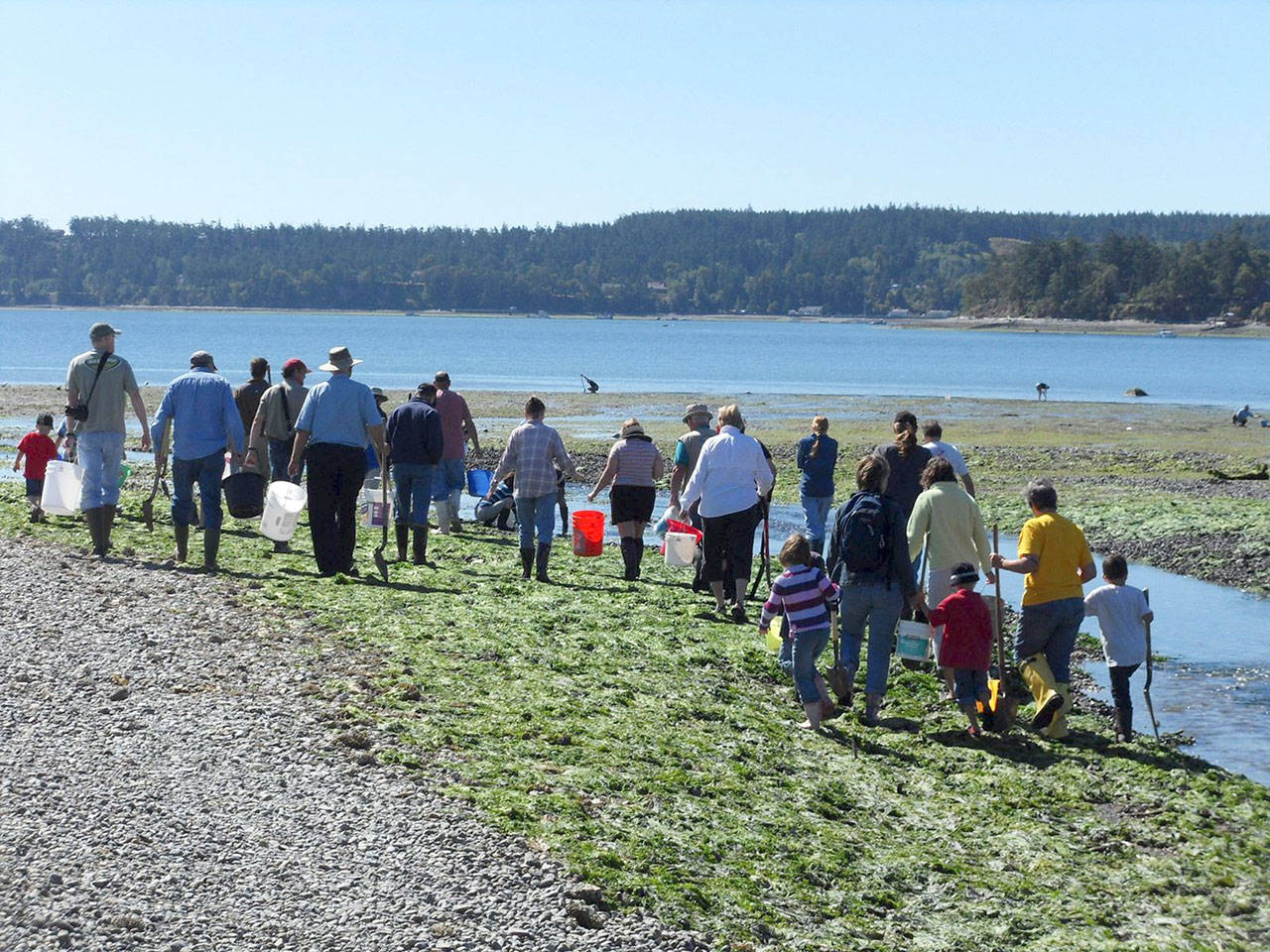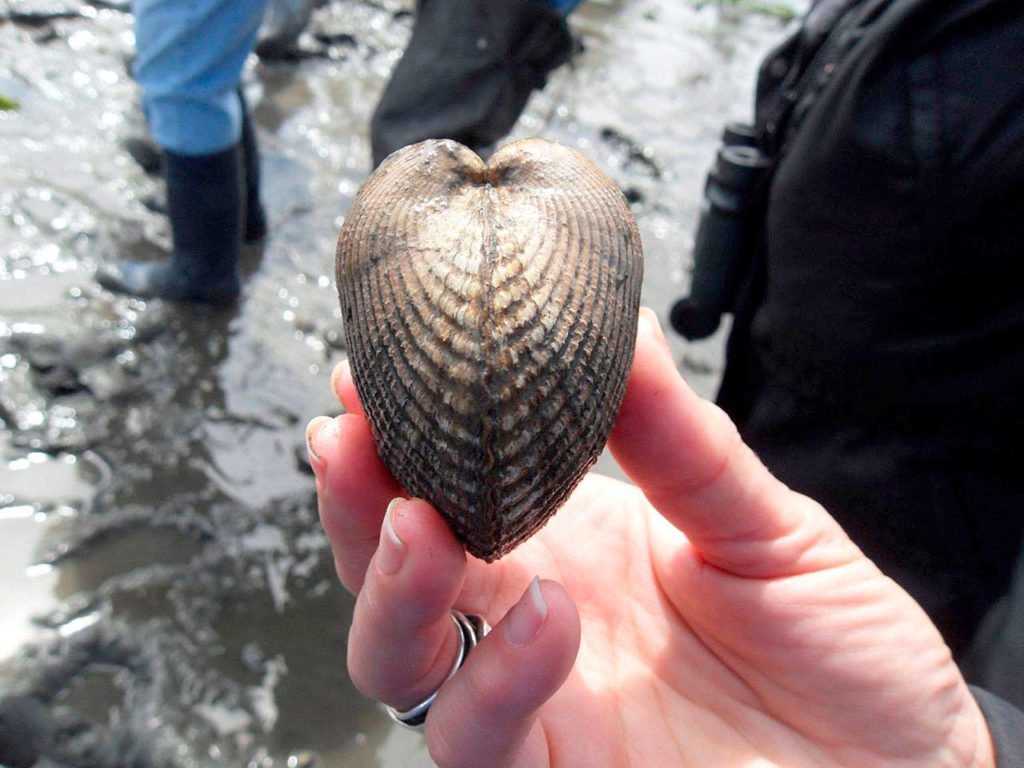FREELAND — The tide’s out, dinner awaits.
But before the shovel hits the sand, there are a few things to remember that might be called the double L, double P tips of clamming.
License, Limit, Poison and Preparation.
Sound Water Stewards is offering its free, popular classes, Digging for Dinner, to teach how to harvest clams safely and sustainably. The class covers how to know if biotoxin concerns have closed Camano or Whidbey’s many beaches to harvesting and how to properly prepare the nuggets of the sea.
The nonprofit environmental and educational group, formerly the Island County Beach Watchers, is in its 10th year of presenting the classes that review local species, such as butter, native littleneck and horse clams.
About 100 people attended the first two classes of the season held in June. Four more classes are scheduled for July.
“Sound Water Stewards provides these classes as a way to teach others to be good stewards and to safely eat and enjoy fresh shellfish,” said Kelly Zupich, the organization’s Whidbey coordinator.
Participants meet at Double Bluff beach. They need to bring a shovel, bucket, boots, hat, sunscreen and drinking water. A donation of $10 per person helps offset the cost of providing the class.
A group shellfish license is provided without charge and covers the activity.
Licensing rules are covered as well as the “open season” dates of different shellfish.
Think “poison” to help you remember “to know before you go.” It means check the shellfish safety map the state provides for the latest updates on closed areas.
“It does depend on multiple factors if a bed is open or not,” Zupich explained. “These are changing times, and it is more and more common to see many of our local clamming beaches closed due to high fecal bacteria, biotoxin or overharvesting.”
Last year, signs went up closing the waters around Penn Cove in Coupeville to any shellfish harvesting because testing revealed high levels of paralytic shellfish poison. The biotoxin can potentially lead to fatal paralytic shellfish poisoning in humans if consumed.
“One misconception is that you can just go out whenever to grab a clam treat for dinner,” Zupich said. “In reality, that mistake can cost you your life. Paralytic shellfish poisoning is nothing to joke about. There are easy ways to keep you and your family safe when harvesting.”
The Penn Cove ban has since been lifted. But several others around the Sound are still in effect.
“There are several bans on shellfish harvesting on Camano and the Skagit Wildlife Area due to pollution,” said Mikaela Montanari, the organization’s Camano coordinator. “All of the Port of Susan is closed due to marine biotoxins.”
“Marine biotoxins or planktonic algae blooms occur from season to season and year to year, depending on the water quality. Many scientists still do not know what causes these blooms.”
Montanari said that’s why it is so important to check Washington’s fish and wildlife website daily. “Conditions can change overnight,” she said.
Limits of size and quantity are also reviewed in Sound Water’s clamming classes.
“The rules depend on the species of clam,” Zupich said. “For horse clams, it is the first seven dug, size or condition does not matter. For the rest of our local species, it is a daily limit of no more than 40 clams, not to exceed 10 pounds in the shell, all species combined.”
How to properly cook clams is also covered in the two-hour classes.
If you missed the June classes, “clam down” — you can still register for one of the classes during low tides this month.
“At this point, we are not offering Digging for Dinner classes on Camano,” Montanari said. “We would love to see that happen in the future.”
Herald writer Sara Bruestle contributed to this report.
If you go
Sound Water Stewards is hosting Digging for Dinner, a free class that teaches how to harvest clams safely and sustainably. Classes are Thursdays and Saturdays during low tides: 9:30 a.m. July 12; noon July 15; 9:30 a.m. July 26; and 10:30 a.m. July 28. All classes are held at Double Bluff beach, S. Double Bluff Road, Freeland.
To sign up, email d4d@soundwaterstewards.org. Put “D4D” in the subject line, what day you prefer, and how many participants. All ages are welcome, but children must be accompanied by an adult.
Bring a shovel, bucket, boots, hat, sunscreen and drinking water. A donation of $10 per person is suggested.
Go to www.soundwaterstewards.org for more information.
Shellfish safety interactive map: www.fortress.wa.gov/doh/eh/maps/biotoxin/biotoxin.html
Talk to us
> Give us your news tips.
> Send us a letter to the editor.
> More Herald contact information.




























